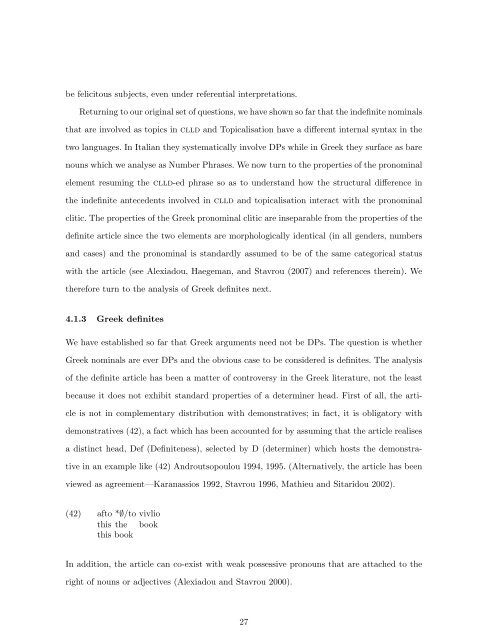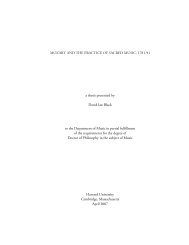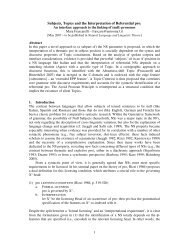draft of November 2011
draft of November 2011
draft of November 2011
You also want an ePaper? Increase the reach of your titles
YUMPU automatically turns print PDFs into web optimized ePapers that Google loves.
e felicitous subjects, even under referential interpretations.<br />
Returning to our original set <strong>of</strong> questions, we have shown so far that the indefinite nominals<br />
that are involved as topics in clld and Topicalisation have a different internal syntax in the<br />
two languages. In Italian they systematically involve DPs while in Greek they surface as bare<br />
nouns which we analyse as Number Phrases. We now turn to the properties <strong>of</strong> the pronominal<br />
element resuming the clld-ed phrase so as to understand how the structural difference in<br />
the indefinite antecedents involved in clld and topicalisation interact with the pronominal<br />
clitic. The properties <strong>of</strong> the Greek pronominal clitic are inseparable from the properties <strong>of</strong> the<br />
definite article since the two elements are morphologically identical (in all genders, numbers<br />
and cases) and the pronominal is standardly assumed to be <strong>of</strong> the same categorical status<br />
with the article (see Alexiadou, Haegeman, and Stavrou (2007) and references therein). We<br />
therefore turn to the analysis <strong>of</strong> Greek definites next.<br />
4.1.3 Greek definites<br />
We have established so far that Greek arguments need not be DPs. The question is whether<br />
Greek nominals are ever DPs and the obvious case to be considered is definites. The analysis<br />
<strong>of</strong> the definite article has been a matter <strong>of</strong> controversy in the Greek literature, not the least<br />
because it does not exhibit standard properties <strong>of</strong> a determiner head. First <strong>of</strong> all, the arti-<br />
cle is not in complementary distribution with demonstratives; in fact, it is obligatory with<br />
demonstratives (42), a fact which has been accounted for by assuming that the article realises<br />
a distinct head, Def (Definiteness), selected by D (determiner) which hosts the demonstra-<br />
tive in an example like (42) Androutsopoulou 1994, 1995. (Alternatively, the article has been<br />
viewed as agreement—Karanassios 1992, Stavrou 1996, Mathieu and Sitaridou 2002).<br />
(42) afto *∅/to vivlio<br />
this the<br />
this book<br />
book<br />
In addition, the article can co-exist with weak possessive pronouns that are attached to the<br />
right <strong>of</strong> nouns or adjectives (Alexiadou and Stavrou 2000).<br />
27
















